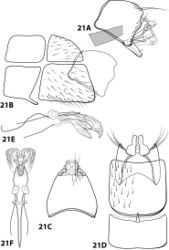Leucotrichia gomezi
| Notice: | This page is derived from the original publication listed below, whose author(s) should always be credited. Further contributors may edit and improve the content of this page and, consequently, need to be credited as well (see page history). Any assessment of factual correctness requires a careful review of the original article as well as of subsequent contributions.
If you are uncertain whether your planned contribution is correct or not, we suggest that you use the associated discussion page instead of editing the page directly. This page should be cited as follows (rationale):
Citation formats to copy and paste
BibTeX: @article{Thomson2015ZooKeys, RIS/ Endnote: TY - JOUR Wikipedia/ Citizendium: <ref name="Thomson2015ZooKeys">{{Citation See also the citation download page at the journal. |
Ordo: Trichoptera
Familia: Hydroptilidae
Genus: Leucotrichia
Name
Leucotrichia gomezi Flint, 1970 – Wikispecies link – Pensoft Profile
- gomezi Flint, 1970: 7 [Type locality: Dominican Republic, La Palma, 12 km E. El Río; NMNH; male; larva, case].
Diagnosis
This species is most similar to Leucotrichia tubifex; in both species, sternum VIII is subquadrate in lateral view and the mesoventral process of segment VII is simple and pointed. The shape of the inferior appendage in each species is similar, with a small mesodorsal spine on the dorsal margin when viewed laterally and apex digitate when viewed ventrally. Leucotrichia gomezi differs from Leucotrichia tubifex in a combination of traits present on the phallus: the presence of large apical lobes, the large dorsal sclerite, and the basal supports of the midlength complex basal loop, none of which are present in Leucotrichia tubifex. Additional similarities and differences are discussed under Leucotrichia tubifex.
Description
Male. Length of forewing 4.3–5.0 mm (n=15). Head unmodified, with 3 ocelli; antennae unmodified. Dorsum of head brown with light brown setae; thorax brown with bronze setae dorsally, brown ventrally; leg segments with brown setae. Forewings covered with fine bronze setae. Genitalia. Abdominal sternum VII with acute mesoventral process. Sternum VIII in ventral view with posterior margin very shallowly concave. Segment IX anterolateral margin produced mesally, posterolateral margin irregular; in dorsal view anterior margin concave, posterior margin straight. Tergum × with dorsal sclerite slender, elongate; ventral sclerite small, reniform; membranous apex with small dorsal lobe and larger, subtriangular ventral lobe. Subgenital plate with dorsal arm triangular; ventral arm slender, apex slightly hooked dorsad, laterally obscured from view by inferior appendage, in ventral view oblong with small basal emargination and apex rounded. Inferior appendage broadest basally, with small dorsomesal spine, apex truncate, bearing single dorsal spine; in ventral view basally subquadrate, apically digitate. Phallus with median complex bearing short basal supports; apex bearing large, flat dorsal sclerite with large, rounded, apical emargination; paired elongate internal sclerites; 2 large, membranous dorsal lobes with apices curving ventrad; 1 smaller, mesoventral lobe (Fig. 21E).
Material examined
Holotype male: DOMINICAN REPUBLIC: La Palma, 12 km E of El Río, 2-13.vi.1969, Flint and Gomez (USNM 70897) (NMNH). Paratypes: same data as holotype, 14 males, 1 female (NMNH); DOMINICAN REPUBLIC: Convento, 12 km S of Constanza, 6-13.vi.1969, Flint and Gomez, 2 females (NMNH).
Etymology
Named after Gomez, one of the collectors of the holotype specimen.
Taxon Treatment
- Thomson, R; Holzenthal, R; 2015: A revision of the Neotropical caddisfly genus Leucotrichia Mosely, 1934 (Hydroptilidae, Leucotrichiinae) ZooKeys, (499): 1-100. doi
Images
|
